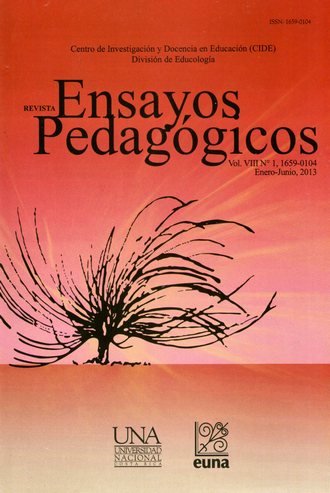Weaving Learning Processes by Means of ICTs: An Experience with Teachers from a Rural Area
DOI:
https://doi.org/10.15359/rep.8-1.3Keywords:
mediation, integrated curriculum, Information and Communication Technologies (ICT), rural education, learningAbstract
This article describes the results of a workshop developed with a group of elementary and high school teachers from the rural zone of Nicoya, where they had the opportunity to elaborate materials and teaching resources supported by information and communication technologies (ICT’s) that they later used in the development of their classes according to their different specialties. The process began with a diagnosis to understand the necessary training topics for the teachers from this zone. Then, the researchers met week by week in order to integrate technologies with the topics of the courses mentioned previously. Later, when the workshops were developed, the opinion of the teachers regarding the work done by the facilitators was evaluated, and the learning process was peer evaluated. In this way, the strengths and opportunities for improvement in the pedagogic mediation processes were identified. This methodology allowed for transformations to begin the learning processes, improving and positively impacting the student body, teachers, and the traditional curriculum that has always been used and to begin taking actions conducive to curriculum integration mediated by technologies.
References
Alonso, M. (2010). Variables del aprendizaje significativo para el desarrollo de las competencias básicas. Editorial Santa Cruz de Tenerife.
Alonso, O. y Zabatta, V. (2012). Estudio de necesidades: Propuesta metodológica para determinar competencias básicas de los docentes en el uso de las TIC. Memorias del Congreso Internacional TIC y Pedagogía. III Edición. Caracas: IUTA.
Araya, F. (2006). Aprendizaje mediado. Recuperado de http://cognitivamediacion.blogspot.com
Avendaño, R. (1988). Una escuela diferente. La Habana: Editorial Pueblo y Educación.
Assman, H. (2002). Placer y ternura en la educación: Hacia una sociedad aprendiente. Madrid: Narcea.
Bertty, J. (2010). Informática educativa. Universidad Popular del Cesar.
Bermúdez, S. y Rodríguez, R. (1996). Teoría y metodología del aprendizaje. La Habana: Editorial Ciencias Sociales.
Betancourt, M. (1997). Pensar y crear: Educar para el cambio. La Habana: Editorial Academia.
Cabello, R. Levis, D. (2007). Medios informáticos en la educación a principios del siglo XXI. Ciudad Autónoma, Buenos Aires Argentina. Prometeo Libros. Recuperado de https://docs.google.com/a/una.cr/document/d/1T_1qkLvqgTZNOpPVtQkujQ2P0mJT8EQyZKu3I9SCRdw/edit#)
Cintrón E, López, M. y Corujo, G. (2006). Principios e ideas que fortalecen un currículo integrado e inclusivo. Colombia: Panamericana Formas e Impresos.
Delors, J (1996). La educación encierra un tesoro. UNESCO. Editorial Santillana, Madrid.
Fainholc, B. (2004). El concepto de mediación en la tecnología educativa apropiada y crítica. Recuperado de http://cmapsinternal.ihmc.us/rid=1119466861556_1804172076_502/educ.ar%20%20Educacion%20y%20TIC_%20El%20concepto%20de%20mediacion%20en%20la%20tecnologia%20educativa%20apropiada%20%20critica.pdf
Fredes, C. (2012). Pedagogía I y II. Recuperado de: http://www.slideshare.net/cintiafredes/mediacin-pedaggica-13521789.
Garibay, G. (1996). Universidad y comunidad. Revista Universitaria 2000(2),
Gutiérrez, A. (2007). Integración curricular de las TIC y educación para los medios en la sociedad del conocimiento. Revista Iberoamericana de Educación, 45. Recuperado de http://www.rieoei.org/rie45a06.htm
Gutiérrez, F. y Prieto, D. (1999). La mediación pedagógica: Apuntes para una educación a distancia alternativa (6ta Ed.). Buenos Aires: Ciccus - La Crujía.
Malagón, J. (2009). Mediaciones sociales. La Mediación Pedagógica. NA 5, II semestre pp. 175-180. ISSN electrónico: 1989-0494.
Manterola A. y Carlos, F. (1995). La formación docente: Un reto imprescindible. Planiuc, 14, (21), 46-53.
Mudrik, A. (1991). La educación y la enseñanza: Una mirada al futuro. Moscú: Editorial Progreso.
Paniagua, M. (2004) La formación y la actualización de los docentes: Herramientas para el cambio en educación. Recuperado de http://www.cedal.org/docus/educ01.pdf
Pérez, G. (1996). Metodología de la investigación educativa. La Habana: Editorial Pueblo y Educación.
Salinas, J. (s. f.). Cambios metodológicos con las TIC. Estrategias didácticas y entornos virtuales de enseñanza-aprendizaje. Universidad de las Islas Baleares. Editorial Universidad.
Salmerón, M. (2011). La integración de las nuevas tecnologías en los centros educativos. EFDeportes.com, Revista Digital, 16(156), 89-95.
Santamaría, M (2012). Innovación docente universitaria en entornos de aprendizaje enriquecidos. I Jornadas Internacionales de Innovación Docente Universitaria en Entornos de Aprendizaje Enriquecidos. Libro de actas: UNED. México.
Vigostky, L..S. (1978). Pensamiento y Lenguaje. Editorial Buenos Aires.
Downloads
Published
How to Cite
Issue
Section
License
Ensayos Pedagógicos is subscribed to the Attribution-NonCommertial-NoDerivatives 4.0 International Creative Commons Licence, which allows both authors and readers to freely download, store, copy, and distribute the final approved publisehd version of the manuscript (post-print) as long as this is done without commercial purposes, no derivative works are generated, and the source and author are mentioned. As well, Ensayos Pedagógicos declares that authors will remain the rightful owners of the copyrights of their work in perpetuity.







